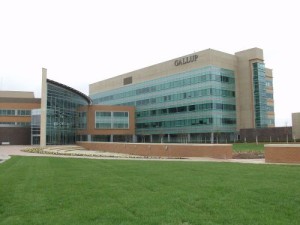Nebraska lawmakers scrutinize Gallup incentives after Watchdog.org report

By Deena Winter | Nebraska Watchdog
LINCOLN, Neb. — Nebraska lawmakers are taking a closer look at their tax incentive programs in the wake of a Nebraska Watchdog report showing Gallup received public subsidies by making its employees work extra hours last year.
GALLOPING TOWARD INCENTIVES: Last year Gallup boosted hours to meet state employment thresholds and qualify for state tax incentives. Lawmakers were told Wednesday that while the practice was legal, they could change the law if they don’t think it should be.
As we reported in April, Gallup earned a $2.5 million tax credit at least in part by encouraging — and sometimes requiring — part-time call center employees to work extra hours and attend workshops. The Washington, D.C.-based polling firm has several offices in Nebraska.
At the time, State Tax Commissioner Kim Conroy said the practice was legal and that if a company bumps up employees’ hours, employees make more money, and that’s good for the economy.
The Watchdog story came up Thursday during a meeting of a special legislative committee studying tax incentives that businesses can get for creating or retaining jobs. Sen. John Harms, chairman of the Tax Incentive Evaluation Committee, asked the Legislative Audit Office to look into whether Gallup’s actions violated the Nebraska Advantage Act or its legislative intent.
The audit office concluded in a brief report that increasing part-time employees’ hours to reach full-time employee thresholds “does not appear to violate the act.”
“Because legislative intent is unclear, we cannot judge whether the practice is in keeping with what the Legislature intended when the act was passed,” the report said. “Consequently, the issue is one of policy — if the Legislature is comfortable with the practice, there is nothing that needs to be done. If it is not comfortable, it could amend the act to prohibit it.”
According to the state tax commissioner’s 2012 report on business incentives, Gallup signed an agreement with Nebraska to get tax credits and rebates on the promise it would invest $4.6 million and add the equivalent of 30 full-time employees.
Earlier this year, a Gallup employee — or former employee — sent Nebraska Watchdog and other media outlets a package of internal Gallup documents showing the company rallied employees to work more hours to help the company earn tax credits.
Employees were required to work seven extra hours in September, for example, and employees were encouraged to attend a three-hour workshop. Other internal memos mandated some overtime for certain employees and offered overtime to others, with prizes for those who put in the most hours.
The Gallup employee who tipped off the media told Nebraska Watchdog many of the call center employees being asked to put in extra time were high school and college students, with jobs starting at minimum wage and progressing to $14 an hour.
But the state tax commissioner said companies need only show they’ve increased employment by a certain number of full-time equivalent employees, which can be part-time or full-time employees, over the course of a year.
The audit office report said while the law requires companies to specify the number of new employees they must hire in a given year, it doesn’t define new employees as full-time employees. The law simply says it’s intended to promote the creation and retention of new jobs.
But some senators on the committee said they want more information on how Gallup obtained its incentives.
Gallup hasn’t responded to a request for comment, but told the Omaha World-Herald bumping up part-timers’ hours was just a part of its efforts to meet state employment thresholds. The company said it added 123 new jobs in Nebraska.
The committee is studying whether incentive programs are working by establishing measurable goals, with plans to have recommendations ready by mid-December. Last year, the Performance Audit Committee released a report saying the program goals were too general to permit a meaningful evaluation of whether they were meeting lawmakers’ intent.
Martha Carter, director of the Legislative Audit Office, told the committee the largest programs have no spending caps, “so by these standards any activity could be deemed a success, and any cost acceptable.”
The committee will hold a public hearing in Kearney on Aug. 27 and in Lincoln on Aug. 28.
Contact Deena Winter at deena@nebraskawatchdog.org. Follow Deena on Twitter at @DeenaNEWatchdog
Editor’s note: to subscribe to News Updates from Nebraska Watchdog at no cost, click here.







